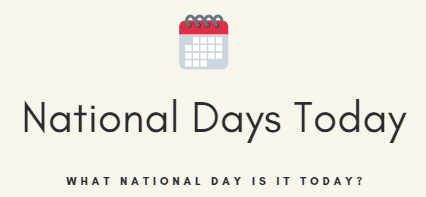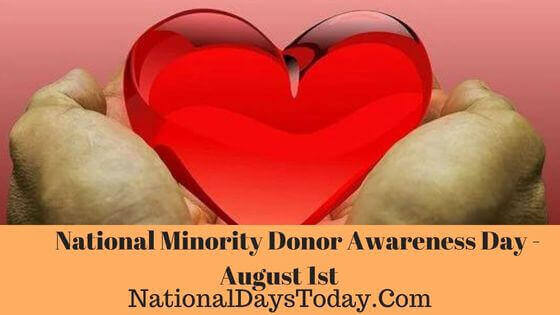National Minority Donor Awareness Day
National Minority Donor Awareness Day:
National Minority Donor Awareness Day is observed annually on August 1st to increase awareness and understanding of the importance of minority donor participation in philanthropy.
| Year | Date | Day | Where |
| 2023 | 1st August | Tuesday | United States |
| 2023 | 1st August | Thursday | United States |
| 2025 | 1st August | Friday | United States |
Twitter Hashtags:
#NationalMinorityDonorAwarenessDay
# MinorityDonorAwarenessDay
Related: Other National Days Celebrated on August 1st
National Raspberry Cream Pie Day
Why National Minority Donor Awareness Day?
As the population of minority groups continues to grow, the need for minority donors becomes increasingly important. Minority patients make up a significant percentage of those awaiting organ transplants, but the number of organs from minority donors does not reflect this percentage. The day was created to help address this disparity and increase the number of organs from minority donors.
The goal of this day is to educate minority communities about the need for organ donations and to encourage them to become organ donors.
In conclusion, National Minority Donor Awareness Day is an important day to raise awareness of the need for minority donors. It is also a day to celebrate and recognize the donors who have given the gift of life. The day is to encourage everyone to learn more about donation and to consider donating blood, organs, or tissues. Together, we can save lives and improve the quality of life for others.
How can we observe National Minority Donor Awareness Day?
- You can help raise awareness by sharing your story about being a donor, or by sharing why you decided to become a donor.
- You can also donate blood or organs, or volunteer your time to help promote and coordinate donation drives. Use Hashtags #MinorityDonorAwarenessDay and #NationalMinorityDonorAwarenessDay on social media.
- You can also help by encouraging your friends, family, and coworkers to become organ or blood donors.
- You can also make a donation in honor of this day.
Spread the word about the importance of minority donors
One of the biggest problems facing the American health system is the lack of minority donors. This lack of diversity can lead to serious health complications for minority patients. It’s important that we spread the word about the importance of minority donors, and encourage people from all backgrounds to donate blood and organs.
If you’re eligible to donate, please consider giving blood or organs. It could save a life. And remember, it’s important to donate blood and organs from all racial and ethnic groups, in order to create a more diverse pool of donors.
Interesting facts about National Minority Donor Awareness Day:
This was created to help raise awareness about the need for more minority donors. On this day, people are encouraged to learn more about the importance of donation and how they can become a donor.
Here are some interesting facts about Minority Donors:
- The goal of the day is to increase the number of registered minority donors by 20%.
- There is a critical need for more minority donors, as minorities make up only 30% of the donor pool.
- African Americans, Hispanics, Asians, and Native Americans account for nearly half of the population in the United States, but they only make up 18% of organ donors.
- Donor information is currently collected by the National Directory of Organ Procurement Organizations (NDPO), but 60 percent of the organs come from living donors.
- A list of all the organ donation organizations in the United States is available on the National Donor Registry website.
History of National Minority Donor Awareness Day:
NMDA is a day set aside to celebrate and raise awareness for the lifesaving power of organ donation among racial and ethnic minority populations in the United States. NMDA was created by the National Donor Sibling Registry (NDSR) in 2004 with the inaugural celebration held on August 14, 2004. The primary purpose of NMDA is to encourage individuals from minority communities to register as organ donors and to share their decision with their families and friends. Each year, NMDA focuses on a different theme that reflects the importance of organ donation within minority communities.
Since its inception, NMDA has grown significantly in both size and scope. In 2013, the U.S. Department of Health and Human Services designated NMDA as an official observance day.
History of Minority Donors
Minority donation is a relatively new field of organ donation that is growing in popularity. The first minority donor transplant took place in 1984 and since then the number of minority donors has increased significantly. Although the need for minority donors is still high, the number of minority donors continues to grow each year. There are many reasons for this growth, but one of the most important is that minorities have a better understanding of the need for transplant organs and how to become a donor.


